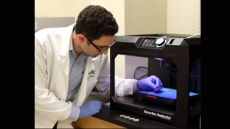Researchers have improved a liquid battery system that could enable renewable energy resources to compete with conventional power plants.
The battery uses two layers of molten metal, separated by a layer of molten salt that acts as the battery's electrolyte. Because each of the three materials have a different density, they naturally separate into layers, like oil floating on water.
The original system, using magnesium for one of the battery's electrodes and antimony for the other required an operating temperature of 700 degrees celsius.
But with the new formulation, with one electrode made of lithium and the other a mixture of lead and antimony, the battery can operate at temperatures of 450-500 degrees celsius.
"When the new battery discharges, lithium atoms in the negative electrode give up an electron and travel through the electrolyte to the lead-antimony electrode. Charging pushes them back in the opposite direction, and the flow of current is enough to keep the metals liquefied," explained Donald Sadoway, an electrochemist at the Massachusetts Institute of Technology (MIT).
The new batteries did well in tests of durability, showing no sign of corrosion after 1,800 hours of operation and maintaining 94 percent of their capacity after 450 complete charge-discharge cycles.
Sadoway estimates that these batteries would keep 85 percent of their charge capacity after a decade of daily cycling.
"There is no battery out there that can offer that level of performance," he noted.
Sadoway says that a large-scale molten-metal unit might cost around $500 per kilowatt-hour of electricity produced.
"But liquid electrodes do not degrade and there are no moving parts, so the maintenance costs would be very low," Sadoway pointed out.
The paper was published in the journal Nature.





